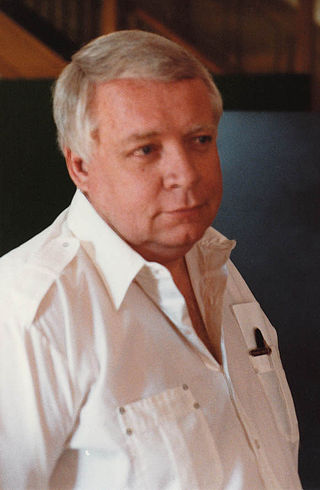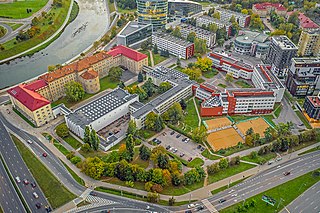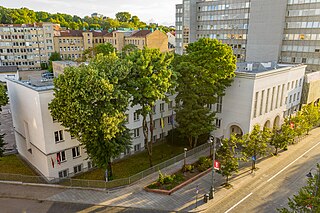Related Research Articles

Politics of Lithuania takes place in a framework of a unitary semi-presidential representative democratic republic, whereby the president of Lithuania is the head of state and the prime minister of Lithuania is the head of government, and of a multi-party system.

Simeon Ivanovich, also known as Semyon Ivanovich, nicknamed the Proud, was Prince of Moscow and Grand Prince of Vladimir from 1340 to 1353.

Algirdas Jonas "Algis" Budrys was a Lithuanian-American science fiction author, editor, and critic. He was also known under the pen names Frank Mason, Alger Rome, John A. Sentry, William Scarff, and Paul Janvier. He is known for the influential 1960 novel Rogue Moon.

Algirdas Mykolas Brazauskas was a Lithuanian politician who served as the fourth president of Lithuania from 1993 to 1998. Previously serving as the prime minister of Lithuania from 2001 to 2006. He was the first democratically elected president of post-Soviet Lithuania.

Vytautas Magnus University (VMU) is a public university in Kaunas, Lithuania. The university was founded in 1922 during the interwar period as an alternate national university.

Algirdas was Grand Duke of Lithuania from 1345 to 1377. With the help of his brother Kęstutis he created an empire stretching from the present Baltic states to the Black Sea and to within 80 kilometres of Moscow.
Algirdas Julien Greimas was a Lithuanian literary scientist who wrote most of his body of work in French while living in France. Greimas is known among other things for the Greimas Square. He is, along with Roland Barthes, considered the most prominent of the French semioticians. With his training in structural linguistics, he added to the theory of signification, plastic semiotics, and laid the foundations for the Parisian school of semiotics. Among Greimas's major contributions to semiotics are the concepts of isotopy, the actantial model, the narrative program, and the semiotics of the natural world. He also researched Lithuanian mythology and Proto-Indo-European religion, and was influential in semiotic literary criticism.

The Klaipėda Revolt took place in January 1923 in the Klaipėda Region. The region, located north of the Neman River, was detached from East Prussia, German Empire by the Treaty of Versailles and became a mandate of the League of Nations. It was placed under provisional French administration until a more permanent solution could be worked out. Lithuania wanted to unite with the region due to its large Lithuanian-speaking population of Prussian Lithuanians and major port of Klaipėda (Memel) – the only viable access to the Baltic Sea for Lithuania. As the Conference of Ambassadors favoured leaving the region as a free city, similar to the Free City of Danzig, the Lithuanians organized and staged a revolt.

Uliana Alexandrovna of Tver was a daughter of Prince Alexander of Tver and Anastasia of Halych. She was the second wife of Algirdas, Grand Duke of Lithuania.

The Order of the Lithuanian Grand Duke Gediminas is the Lithuanian Presidential Award which was re-instituted to honour the citizens of Lithuania for outstanding performance in civil and public offices. Foreign nationals may also be awarded this Order. The Order of the Lithuanian Grand Duke Gediminas was instituted in 1928. It features the Columns of Gediminas, one of the national symbols of Lithuania.

Vytautas Magnus University Education Academy – an academical unit of Vytautas Magnus University, which specialized in preparing school teachers and other educators. Located in Vilnius and Kaunas, Lithuania.

Constitutional Court of the Republic of Lithuania is the constitutional court of the Republic of Lithuania, established by the Constitution of the Republic of Lithuania of 1992. It began the activities after the adoption of the Law of Constitutional Court of the Republic of Lithuania on 3 February 1993. Since its inception, the court has been located in Vilnius.
Gintaras Rinkevičius is a Lithuanian conductor, who was awarded the Lithuanian National Prize for Culture and Arts in 1994. In 1989 he founded the Lithuanian State Symphony Orchestra.

Algirdas Butkevičius is a Lithuanian politician and was Prime Minister of Lithuania, serving between 2012 and 2016. He also served as the Minister of Finance from 2004 to 2005 and the Minister of Transport and Communications from 2006 to 2008. He led the Social Democratic Party of Lithuania from 2009 to 2017.

The Socialist People's Front is a left-wing political party in Lithuania formed out of the December 19, 2009, merger of the Front Party and Lithuanian Socialist Party. Held at Vilnius University, the party's foundation featured 102 delegates. The merger was approved by an affirmative vote of 96 delegates, with three against and one abstaining. The leader of the Lithuanian Socialist Party, Giedrius Petružis, refused candidacy for chairperson of the merged party, claiming a desire to return to academic life. The leader of the Front Party, Algirdas Paleckis, was unanimously chosen as the leader of the SPF.
This article is about the particular significance of the year 2010 to Lithuania and its people.
Events in the year 2012 in Lithuania.
Budrys is a Lithuanian surname. It evolved from the ancient Lithuanian personal name Budrys. The patronymic surname Budraitis is derived from this given name.
Algirdas is a Lithuanian male given name, derived from the Lithuanian terms al and gandas or girdintis ("hearing"). Variants of the name include Algis and Elgirdas. Algirdas may refer to:

Jonas Budrys was a counterintelligence officer and later a Lithuanian diplomat. He is best known as the commander of Lithuanian forces during the Klaipėda Revolt in January 1923. The region was a League of Nations mandate administered by the French. Budrys led a small Lithuanian military force into the region and successfully took control. Klaipėda was incorporated into Lithuania as an autonomous region. After the revolt, Budrys served as Lithuania's representative to the region and its first governor until 1925. He was later Lithuanian consul to East Prussia and New York City. His son, Algis Budrys, was a science fiction writer.
References
- (in Lithuanian) prof. Algirdas Budrys, klarnetininkas [ permanent dead link ]. Lithuanian Music Academy. Retrieved 2010-12-21.